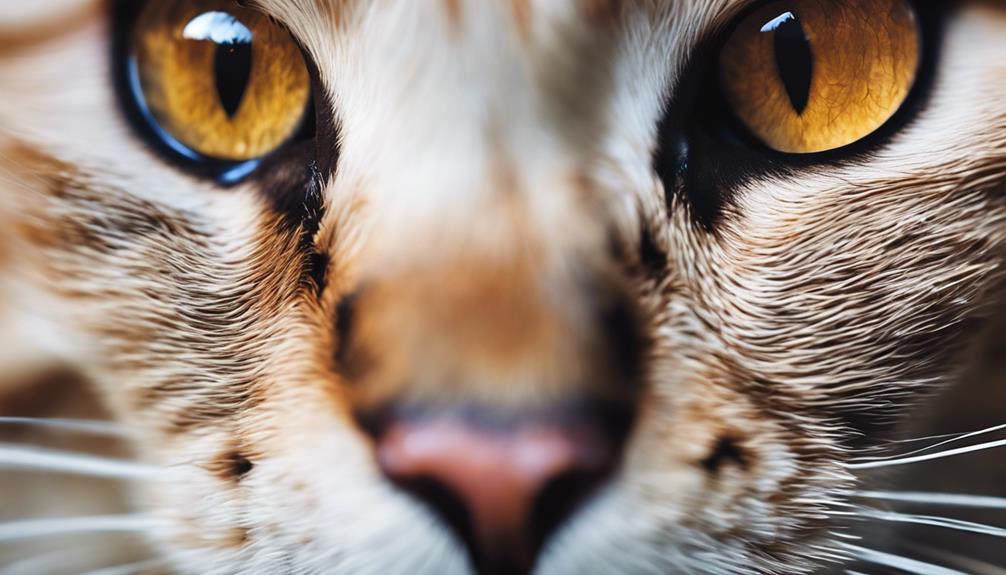Cats can safely enjoy cooked fish occasionally. Opt for boneless choices like salmon, tuna, or mackerel. These contain beneficial omega-3 and omega-6 fatty acids. These nutrients boost brain function and overall energy levels in cats. Make sure the fish is thoroughly cooked and free of harmful seasonings. Remove bones to prevent choking hazards. Quality matters, so go for premium human-grade fish brands. Remember, moderation is key, with fish intake less than 10% of their diet. Cooked fish offers health benefits for your feline friend.
Key Takeaways
- Cooked fish is safe for cats, providing omega-3 and omega-6 fatty acids.
- Boneless cooked fish prevents choking hazards.
- Oily fish like salmon benefit brain function and energy levels.
- Ensure proper cooking to eliminate harmful bacteria and preserve nutrients.
- Limit fish intake to less than 10% of the cat's diet.
Types of Cooked Fish Safe for Cats
When it comes to choosing cooked fish that are safe for cats, options like salmon, tuna, and mackerel stand out as excellent choices. These fish aren't only delicious but also provide essential omega-3 fatty acids that contribute to your cat's overall health. Omega-3 fatty acids are important for supporting brain function, energy levels, and a shiny coat in our feline friends.
It's important to make sure that the cooked fish offered to cats is boneless to prevent any choking hazards. Oily fish varieties like salmon are particularly beneficial as they contain high levels of omega-3 and omega-6 fatty acids, which are essential for maintaining your cat's well-being. These nutrients are often found in high-quality cat foods, but offering plain, cooked fish as an occasional treat can be a nutritious addition to your cat's diet.
Benefits of Fish in Cat Diet

Moving from the types of cooked fish safe for cats, we can now explore the benefits that fish can offer in a cat's diet. Fish is a fantastic source of essential nutrients such as omega-3 fatty acids, important for maintaining ideal brain function in our feline friends. These fatty acids not only support cognitive health but also aid in boosting energy levels, keeping our cats active and playful. Additionally, fish, especially oily varieties like salmon, tuna, and sardines, are rich in healthy fats that contribute to overall well-being.
To highlight the advantages of incorporating fish into a cat's diet, let's take a closer look at the benefits in the table below:
| Benefits | Description |
|---|---|
| Omega-3 Fatty Acids | Essential for brain function, supporting cognitive health in cats. |
| Energy Levels | Aids in boosting energy levels, keeping cats active and playful. |
| Healthy Fats | Rich in healthy fats that contribute to overall well-being in feline friends. |
| Nutrient Absorption | Supports the absorption of essential vitamins necessary for the overall health of our beloved cats. |
Precautions When Feeding Cooked Fish

When feeding cooked fish to your feline friends, always remember to remove any bones to prevent choking incidents.
Additionally, avoid using any seasonings or spices that could be harmful to your cat's health.
Fish Bone Hazards
Taking precautions when feeding cooked fish to cats involves carefully checking for and removing any fishbones before serving. Fishbones can cause internal damage and choking hazards in our feline friends, leading to pain and digestive issues. These sharp bones offer no nutritional benefit and should be entirely avoided in their diets.
It's important to make sure that no bones are present in the cooked fish before offering it to our beloved cats. Swallowing fishbones can pose a serious risk to their health, so a thorough inspection is necessary to keep them safe. By diligently checking for and eliminating any fishbones, we can prevent potential harm and provide our cats with a safe and enjoyable dining experience.
Seasonings and Spices
Upon providing cooked fish to cats, be cautious of any seasonings or spices added, as they can pose a risk to our feline companions. When offering cooked fish to cats, remember to:
- Avoid seasonings like garlic, onion, or salt.
- Be aware that human seasonings may not be suitable for cats.
- Stick to plain, unseasoned cooked fish to guarantee cat safety.
- Keep it simple to allow cats to savor the natural flavors of fish.
These precautions are crucial as cats are sensitive to certain seasonings and spices that can disturb their stomachs or even be toxic. By serving plain cooked fish, you can safeguard your cat's health and enjoyment without any unnecessary risks.
Freshness and Storage
Guaranteeing the freshness and proper storage of cooked fish is essential for maintaining its quality and safety when feeding it to your cat.
To keep cooked fish fresh, store it in airtight containers in the refrigerator for up to 3 days. Remember to cool the fish properly before refrigerating to prevent bacteria from multiplying.
When reheating cooked fish for your cat, make sure it's thoroughly heated to eliminate any harmful bacteria. Avoid leaving cooked fish at room temperature for too long to prevent spoilage.
Always check for signs of spoilage like strange odors or a slimy texture before serving cooked fish to your feline friend.
How to Safely Prepare Fish

When preparing fish for your cat, always remember to eliminate all bones to prevent choking hazards. Baking or poaching fish without any seasonings is the ideal way to prepare it for your cat. Fried fish should be avoided as it's too fatty and can lead to health issues. Guarantee that the fish is thoroughly cooked to eliminate any potential harmful bacteria. Using stainless steel cat feeders can make it easier to serve the cooked fish to your cat.
Here are some tips to safely prepare fish for your feline friend:
- Eliminate Bones: Carefully check and eliminate all bones from the cooked fish.
- Bake or Poach: Opt for baking or poaching methods without seasonings for a safe meal.
- Avoid Fried Fish: Stay away from fried fish due to its high-fat content.
- Thoroughly Cooked: Make sure the fish is fully cooked to prevent any harmful bacteria.
Nutritional Value of Cooked Fish

Cooked fish offers essential nutrients like omega-3 and omega-6 fatty acids that are vital for a cat's brain function. These nutrients help support energy levels, vitamin absorption, eyesight, heart health, joint function, skin condition, and the immune system.
Oily fish such as salmon, tuna, and sardines are particularly rich in healthy fats that can benefit a cat's overall health when included in moderation.
Health Benefits
Indulging our feline friends with cooked fish offers a wealth of health benefits due to its rich nutritional value. When including fish in your cat's diet, you provide essential omega-3 and omega-6 fatty acids important for brain function.
Additionally, fish supports your cat's energy levels and aids in the absorption of important vitamins. Not only does eating fish benefit your cat's eyesight, heart health, and joint mobility, but it also helps maintain healthy skin condition and boosts the immune system.
Oily fish like salmon, tuna, and sardines offer high levels of healthy fats that contribute to your cat's overall well-being. Including cooked fish in your cat's meals can lead to a healthier and happier furry companion.
Potential Risks
Including cooked fish in your cat's diet can bring about potential risks related to its nutritional value, particularly if specific precautions aren't taken.
While cooked fish is rich in omega-3 fatty acids beneficial for feline health, feeding raw fish to cats can be harmful due to the presence of the thiaminase enzyme and potential bacteria that may cause illness.
Unlike fish prepared for human consumption, fish for cats should be cooked thoroughly to eliminate any harmful pathogens. Additionally, make sure all bones are removed before serving to prevent choking hazards.
Risks of Feeding Cats Raw Fish

Feeding cats raw fish poses serious health risks due to the presence of thiaminase, harmful bacteria, and the potential for food poisoning and internal injuries. When contemplating offering your feline companion raw fish, it's vital to comprehend the dangers involved:
- Vital: Raw fish contains thiaminase, an enzyme that can break down thiamine, an important vitamin for cats' health.
- Ensure: Raw fish may harbor harmful bacteria like E. coli and salmonella, putting your cat's well-being at risk.
- Crucial: Raw fish poses a significant risk of food poisoning due to potential contaminants, leading to digestive issues.
- Internal Injuries: Feeding raw fish to cats can result in internal damage and choking hazards from fish bones, causing harm to your beloved pet.
Considering these risks, choosing cooked fish over raw fish is a safer choice to safeguard your cat's health and well-being.
Importance of Cooking Fish for Cats

After highlighting the importance of cooking fish for cats' safety, it becomes evident that preparing fish is vital for guaranteeing the well-being of our feline friends. Cooking fish for cats is essential as it helps eliminate harmful bacteria like E. coli and salmonella that can pose serious health risks to our beloved pets. Additionally, by cooking fish, we can avoid thiaminase, an enzyme found in raw fish that can lead to thiamine deficiency and neurological issues in cats.
Properly cooked fish ensures that all bones are removed, reducing the risk of choking hazards for our furry companions. Additionally, cooking fish for cats helps preserve essential nutrients that may otherwise be lost during the cooking process. This guarantees that our cats receive the necessary vitamins and minerals for their overall health and well-being.
Fish Bone Hazards for Cats

To guarantee the safety of our feline companions, it's essential to be aware of the hazards posed by fish bones when feeding cats. When it comes to our beloved cats and fish, precautions are necessary to prevent any potential harm.
- Fishbones can pose a choking hazard: Cats may accidentally swallow fishbones, which can lead to choking and discomfort.
- Internal damage is a risk: Swallowing fishbones can cause internal injuries or blockages in a cat's digestive system.
- No nutritional benefits: Fishbones offer no nutritional value for cats and should be avoided to prevent any health issues.
- Remove all fishbones: Before serving fish to your cat, make sure that all bones are removed to prevent any unwanted health complications.
Fish Allergy Symptoms in Cats

Fish allergy symptoms in cats can range from vomiting and diarrhea to itching, redness, or swelling.
Skin reactions like hives or dermatitis are common signs of a fish allergy in felines.
In severe instances, anaphylaxis may occur, leading to breathing difficulties, warranting immediate veterinary attention.
Allergic Reactions in Cats
How can allergic reactions in cats, specifically fish allergy symptoms, manifest and what're the signs to watch out for?
Here are some key indications of fish allergies in cats to keep an eye on:
- Skin reactions: Look for signs of itching, redness, or swelling on your cat's skin.
- Gastrointestinal symptoms: Monitor for vomiting and diarrhea after your cat consumes fish.
- Anaphylaxis: Be aware of any difficulty breathing or extreme reactions that could indicate anaphylaxis.
- Consult a veterinarian: If you suspect your cat has a fish allergy, seek professional guidance for proper diagnosis and management.
It's essential to prioritize your cat's health and well-being, especially when dealing with potential allergies.
Fish Allergy Signs
Observing signs of fish allergy in cats is vital for their well-being, including symptoms like vomiting, diarrhea, itching, and skin redness. Cats allergic to fish may also show sneezing, coughing, and difficulty breathing. It's important to be watchful for any allergic reactions, as these can vary from mild to severe, requiring immediate veterinary attention. Some cats may develop fish allergies over time, even if they have previously consumed fish without issues. Here is a table summarizing common fish allergy signs in cats:
| Fish Allergy Signs in Cats |
|---|
| Vomiting |
| Diarrhea |
| Itching |
| Skin Redness |
Recommended Fish Portions for Cats

Incorporating fish in a cat's diet should be limited to less than 10% of their total food intake. When feeding fish to your cat, remember to do so in moderation to prevent any health issues. Here are some key points to keep in mind when considering fish portions for your feline friend:
- Important Nutrients: Cooked fish provides essential nutrients like protein and omega-3 fatty acids that are beneficial for your cat's overall health.
- Moderation is Key: While fish can be a valuable addition to your cat's diet, it should be given in moderation to avoid any potential adverse effects.
- Boneless: Always make sure that the cooked fish you offer your cat is boneless to prevent any choking hazards or digestive issues.
- Free of Seasonings: It's important to serve fish to your cat without any seasonings or additives that could be harmful to their digestive system.
Popular Fish Choices for Felines

Popular choices of fish safe for cats include tuna, mackerel, salmon, and shellfish, all of which offer essential nutrients for felines. These fish varieties are not only delicious but also provide crucial omega fatty acids and lean protein that support your cat's overall health. Here is a table highlighting the benefits of each of these popular fish choices:
| Fish | Omega Fatty Acids | Lean Protein |
|---|---|---|
| Tuna | High | Yes |
| Salmon | High | Yes |
| Mackerel | Moderate | Yes |
Tuna and salmon stand out for their high omega fatty acid content, promoting a shiny coat, healthy heart, and robust immunity in your furry friend. Additionally, all these fish options offer lean protein, aiding in muscle development and overall well-being. Remember to remove all bones before serving cooked fish to your cat to guarantee a safe dining experience. Introducing a variety of these cooked fish choices in moderation can be a nutritious addition to your cat's diet.
Cooking Tips for Cat-Safe Fish

After exploring the benefits of popular fish choices for felines, let's now focus on practical cooking tips to guarantee the safety of feeding fish to cats.
When preparing fish for our furry friends, it's essential to remove all bones to prevent any choking hazards. Baking or poaching fish without any seasonings is the best cooking method for ensuring it's safe for our cats.
We should steer clear of feeding fried fish to our feline companions as it's too fatty and not ideal for their health. To make sure the fish is safe for our cats, we must cook it thoroughly to eliminate any potential harmful bacteria.
Using stainless steel cat feeders can also make the process of feeding fish to our cats easier and safer.
- Remove Bones: Always ensure to carefully eliminate all bones from the fish to avoid any choking hazards.
- Cooking Method: Opt for baking or poaching fish without seasonings to keep it safe for cats.
- Avoid Fried Fish: Stay away from feeding fried fish to cats due to its high fat content.
- Thorough Cooking: Cook fish thoroughly to eliminate harmful bacteria before offering it to cats.
Cat-Friendly Fish Brands

When it comes to choosing cat-friendly fish brands, we strive for safe options, nutritious choices, and recommended brands.
Our goal is to provide our feline friends with high-quality fish ingredients that prioritize their health and well-being.
Safe Fish Options
What fish brands are deemed safe options for cats to enjoy? When it comes to feeding our feline friends, safety and health are our top priorities. Here are some cat-friendly fish brands to ponder:
- Salmon: Rich in omega-3 fatty acids, salmon can promote healthy skin and coat for your cat.
- Mackerel: A flavorful fish that provides essential nutrients like vitamin D and selenium for your cat's well-being.
- Tuna: A favorite among many cats, tuna is a protein-rich option that can support muscle growth and maintenance.
- Sardines: With their high-fat content, sardines can boost brain function and contribute to your cat's overall health.
These fish options can make your cat feel satisfied and nourished while ensuring their safety and well-being.
Nutritious Fish Choices
For feline health and well-being, consider incorporating cat-friendly fish brands such as fresh cuts of salmon, tuna, mackerel, and sardines into their diet. These options are rich in omega-3 fatty acids, essential for your cat's brain function.
Opt for boneless fish to guarantee your cat's safety and prevent any choking hazards. Brands like Wellness Core, Blue Buffalo, and Taste of the Wild offer quality cat-friendly choices packed with nutrients to support your feline friend's overall health.
Consulting with your veterinarian is essential to make sure that the fish you select is both safe and beneficial for your cat. Providing these nutritious fish choices can be a tasty way to enhance your cat's diet and promote their well-being.
Recommended Fish Brands
Considering your feline companion's health, choosing high-quality, human-grade fish brands specially designed for cats is crucial to guarantee optimal nutrition and well-being. When picking cat-friendly fish brands, take into account the following:
- Seek out premium fish brands that use human-grade fish suitable for cats.
- Select fish brands that are free of preservatives, additives, and artificial flavors.
- Opt for brands that offer a variety of fish options such as salmon, tuna, and mackerel.
- Guarantee that the chosen fish brands prioritize safety, quality, and nutritional value for your feline friend.
Seeking advice from your veterinarian can also provide valuable recommendations tailored to your cat's specific needs and preferences.
Health Risks of Uncooked Fish

Consuming uncooked fish poses serious health risks to cats due to the presence of thiaminase, a destructive enzyme that can lead to neurological issues. Thiaminase in raw fish can break down thiamine, causing a deficiency that may result in seizures, muscle weakness, and even death in cats.
Additionally, uncooked fish can harbor harmful bacteria like E. coli and salmonella, putting your feline friend at risk of food poisoning. These health hazards can lead to digestive issues such as vomiting and diarrhea, making it essential to avoid feeding your cat uncooked fish.
Ensuring the well-being of your cat involves steering clear of raw fish and opting for cooked alternatives. By prioritizing your cat's health and safety, you can prevent potential health risks and support their overall wellness. Remember, when it comes to your cat's diet, choosing safe and appropriate foods is vital for their health and happiness.
Fish Oil Benefits for Cats

Enhancing a cat's overall well-being can be achieved through the inclusion of fish oil in their diet, which is rich in essential omega-3 and omega-6 fatty acids beneficial for brain function and various aspects of their health. Fish oil provides a myriad of benefits for our feline friends:
- Omega-3 fatty acids from fish oil support brain function, aiding in cognitive health and mental acuity.
- Omega-6 fatty acids help maintain a healthy skin condition, reducing dryness and itchiness.
- Fish oil contributes to improved joint function, promoting mobility and flexibility in cats.
- The inclusion of fish oil in a cat's diet can lead to enhanced heart health, supporting overall cardiovascular function.
Frequently Asked Questions
What Cooked Fish Can Cats Eat?
Cooked fish that cats can safely eat include tuna, salmon, mackerel, and white fish. Remove all bones and serve the fish plain without any seasonings. Moderation is crucial for a healthy cat diet.
What Is the Safest Fish for Cats?
The safest fish for cats include cooked salmon, tuna, mackerel, and shellfish. These provide essential nutrients like omega-3 fatty acids, protein, and healthy fats. Remove all bones and avoid seasonings for cat safety.
Why Can't Cats Eat Fish?
Why can't cats eat fish? Thiaminase in raw fish destroys thiamine, causing neurological issues. Cooked fish is safer, eliminating risks of harmful bacteria. Always remove bones to prevent choking hazards. We guarantee our feline friends stay healthy!
Is Fish or Chicken Better for Cats?
For cats, fish and chicken both offer health benefits. Fish provides omega-3s for brain and heart health, while chicken is a lean protein good for muscle growth. Our feline friends can enjoy a balanced diet with either choice.
Is It Safe for Cats to Eat Cooked Beans?
Yes, cats and beans safety is a real concern. Cooked beans are generally safe for cats to eat in moderation. However, some cats may experience digestive issues or allergic reactions. It’s important to introduce new foods gradually and monitor their reactions. Certain beans, like kidney beans, can be toxic to cats if not prepared properly.
Conclusion
To sum up, cooked fish can be a safe and nutritious addition to your cat's diet. Just like a fish swimming gracefully in the ocean, well-prepared fish can provide essential nutrients for your feline friend.
Remember to follow precautions, choose cat-friendly brands, and enjoy the benefits of fish oil.
With proper care and attention to detail, your cat can enjoy the benefits of cooked fish without any fishy business.









